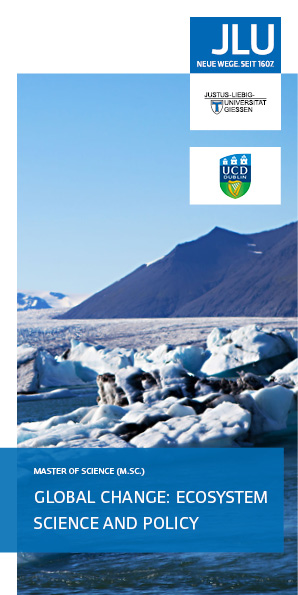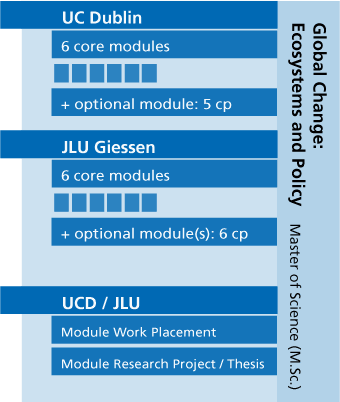Global Change: Ecosystem Science and Policy
Master of Science (M.Sc.), jointly awarded by Justus Liebig University Giessen and University College Dublin
Overview
-
Foto: Michael Zysman/123rf.com
Study Programme
- Composition of the Study Programme (neue Module)
-
Degree
Master of Science (MSc)
Jointly awarded by Justus Liebig University Giessen and University College Dublin
Duration of studies
3 semesters (16 months) – 120 credit points (cp)
Composition of degree programme
Graduates will be equipped with three generic skill sets:
- Global change science (climate change, ecosystem research, biodiversity, land use change, resource management etc.),
- Policy and communication (policy and law, regulation and governance, stakeholder involvement, policy advice etc.),
- Data management, analysis and reporting (research methods, data collection, data analysis and evaluation, modelling etc.)
The Master’s course consists of 12 core modules and at least two (11 cp) optional modules. The core modules are predefined and the optional modules can be chosen from a broad catalogue of modules.
UCD modules, 35 credit points:
Core modules cp Data Analysis and Interpretation 5 Designing Global Change Research Projects 5 Global Change Ecology – Introduction 5 Science and Policy 5 Environmental Impact Assessment 5 Environmental Law and Policy 5 Optional module (5 cp), e.g.: a. Biodiversity (5 cp)
b. Peatland and Environmental Change (5 cp)
JLU modules, 35 credit points:
Core modules cp Global Change: Modelling and Advanced Techniques 5 Adaption to Global Change 3 Political Consulting - Environmental Policy and Development Cooperation 6 Resource Economics, Sustainability and Environmental Management 6 Biodiversity Informatics 3 Sustainable Agroecosystems 6 Optional module(s) (6 cp), e.g.: a. Field Methods in Global Change Research (3 cp)
b. Human Health Impacts of Climate Change: the International Dimension (6 cp)
c. Stress Ecology (3 cp)
d. Into the Footsteps of a Researcher (3 cp)
e. Man in Past Climates and Climate Change Impacts (3 cp)
Module: Work Placement (20 cp)
The work placement module allows our students to gain an initial insight into the different areas of work they may wish to pursue in the future. It also enables them to gain practical work experience and establish contacts with potential future employers. The 6-week work placement can be carried out in various companies or institutions all over the world. Benefit from our contacts and complete the work placement in renowned institutions such as:
- International Atomic Energy Agency (IAEA) Vienna
- World Meteorological Organization (WMO) Geneva
- Food and Agriculture Organization (FAO) Rome
- Environmental Protection Agency (EPA) Ireland
- Research Institute for Sustainability (RIFS) Potsdam
- Potsdam Institute for Climate Impact Research (PIK) Potsdam
- ICLEI European Secretariat Freiburg
- Rural Investment for a Sustainable Europe (RISE) Foundation Brussels
- International Union for Conservation of Nature (IUCN) Brussels
- Fortescue Future Industries (FFI) Barcelona
- Institute for Global Environmental Strategies (IGES) Tokyo
- Marine Institute, Ireland
- Department of Agriculture, Forestry and the Marine, Ireland
- Sustainable Food Trust, UK
- Environmental Consultancies
- NGOs
- Scottish Wildlife Trust
Module: Research Project / Thesis (30 cp)
The third semester is devoted to writing the Master's thesis. The thesis demonstrates the student's ability to conduct independent research on a given topic within a limited period of time. It can be undertaken at either UCD, JLU or external institutions.
Application
- Application: Commencement of studies
-
Commencement of studies
Only possible in the winter semester;
The course starts in September (September - December) at University College Dublin (UCD). The first semester is followed by a 6 week work placement (January - February). Students continue their studies at Justus Liebig University Giessen (second semester; March - July). The third semester (August - December) is comprised of the Master's thesis which can either be written at UCD or at JLU.
- Application: admission and registration
-

Application and enrolment for the course take place at University College Dublin.
To apply online go to www.ucd.ie/apply, create a user account, select "Postgraduate Programmes" and select "MSc Global Change: Ecosystems and Policy".
- Application: Entrance requirements
-
Entrance requirements
Applicants must hold a Bachelor's degree with at least 180 ECTS-points and an average grade of 2.48 (UCD grade points, see special regulation § 26 of the table comparing JLU/ UCD grade points) or better in one of the following scientific fields:
- Biology
- Agricultural Studies
- Natural or Environmental Sciences
On an individual basis, the Examination Board may accept other study programmes as equivalent such as zoology, ecology, geology or biochemistry and may also subject them to specific requirements.
- Application: Language requirements
-
Language requirements
As the entire degree course is taught in English, applicants must provide proof of sufficient knowledge of written and spoken English if the first degree was not obtained in English. The following test results will be accepted as proof of sufficient language proficiency:
- TOEFL (Test of English as a Foreign Language) paper-based: 600 points
- TOEFL (Test of English as a Foreign Language) internet-based: 100 points
- IELTS Academic Test (International English Language Testing System): 6.5 points
There are also other approved English competency tests. Please contact the study coordinators for the required results in these tests (see "contact").
Career Options
Contact
-
Subject Advisor
- Global Change: Ecosystem Science and Policy
-
Programme Director (UCD)
Dr. Florence Renou-Wilson
Phone +358 87 2836078
E-Mail: Florence.renou
Programme Co-ordinator (JLU)
Regina Gaitsch
Heinrich-Buff-Ring 38
35392 GiessenPhone +49 641 99 35003
E-Mail: Studienkoordination
Head of Degree Programme (JLU):
Prof. Dr. Christoph Müller
Justus-Liebig Universität Gießen
Institut für Pflanzenökologie, IFZ
Heinrich-Buff-Ring 26
35392 GiessenPhone +49 641 99 35301 (Secr.)
E-Mail: Christoph.Mueller
Further Information
- Links
-
JLU Giessen
- Faculty 08 Biology and Chemistry
- Faculty's Deanery
- Examinations office of Natural Sciences
- Student representatives
University College Dublin


